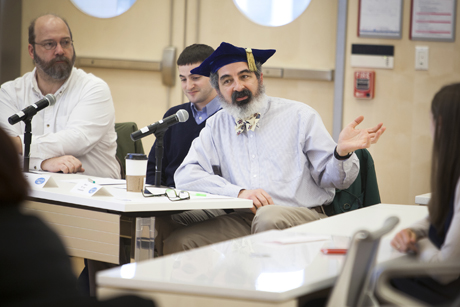Star faculty shine at CALS Faculty Idol
By Stacey Shackford

It was no mystery why Jeff Niederdeppe was crowned CALS’s first “Faculty Idol” – he stole the show at Stocking Hall March 19 with a whodunit presentation of his research into health communication.
The assistant professor of communication was one of seven faculty members from the College of Agriculture and Life Sciences (CALS) to participate in the inaugural event, created as a fun way to get to know young faculty and their research.
The contestants had just three minutes to communicate their work clearly and creatively, using whatever means of presentation they preferred.
Niederdeppe overcame the challenge using a tight story arc, setting up several segments of the media as suspects in the mystery of why the American public is confused about the causes of cancer and how to prevent it. Media coverage that is short, sensationalized, oversimplified and out of context seems to contribute to the problem, he said, and pointed to data from some of his studies.
“Newspapers have an alibi, the Internet has an alibi … local TV news, on the other hand, looks suspicious and has a motive: Sensationalism draws eyeballs to the screen,” Niederdeppe said. “The verdict from five years of research in our lab is that local TV news is guilty as charged.”
Judges included John “Call me Simon Cowell” Carberry, the university’s director of media relations; communication professor Bruce “B.Lew” Lewenstein – “just like J.Lo, but better dressed,” as emcee Anthony Hay, professor of microbiology, announced; and Tom “Dawg” DiLiberto ’06, a meteorologist whose win as “America’s Science Idol” at last year’s American Association for the Advancement of Science meeting inspired the competition.
The judges praised Minglin Ma, assistant professor in the Department of Biological and Environmental Engineering, for the way he unpackaged his complicated cellular research – with the assistance of a PowerPoint presentation featuring pop culture references.
Jonathon Schuldt, assistant professor of communication, referenced the movie “Mean Girls” in his second-place presentation, “How to subtly sabotage your high school nemesis.” The 2004 film featured straightforward sabotage tactics, such as convincing a friend that a candy bar will help with weight loss.
Based on his research into factors that influence judgment and decision-making, Schuldt offered some modern alternatives that don’t involve lying, but rather rely on subtle advertising cues. Give your nemesis a candy bar with a green calorie label, or the “fair trade” or “organic” designations, he suggested. His studies have shown that people assume such items are healthier. Or have a thin friend make the offer, he said.
“I use this knowledge to improve and advance human health. I leave it to you to decide if you will use it for good, or for more deviant purposes,” Schuldt concluded.
Sharon Poczter, assistant professor at the Dyson School of Applied Economics and Management, placed third, with her overview of research into bank bailouts, “‘Wolf of Wall Street’ or economic superhero?”
Marine microbiologist Ian Hewson played an avant-garde film titled “’Twixt Life and Death Exists the Assistant Professor,” in which he searched several bleak Ithaca winter landscapes for the answer to puzzling questions about sea star viruses – and found the answer in street signs and soup.
He was commended for his creativity and audience engagement, but received null points for clarity; his few subtitles were in French, which none of the judges understood.
All participants were awarded certificates and prizes, with the top three battling for $1,000 in discretionary funds, $1,000 worth of professional photography, or website consultation and redesign.
Stacey Shackford is staff writer for the College of Agriculture and Life Sciences.
Media Contact
Get Cornell news delivered right to your inbox.
Subscribe